Will Framing Britney Spears be a moment of reckoning for the celebrity media?
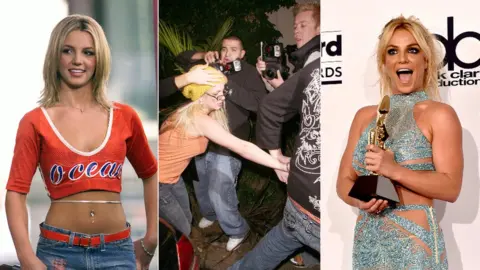 Getty Images
Getty Images"Everybody's talking all this stuff about me. Why don't they just let me live?"
So sang Britney Spears on her 2004 single My Prerogative.
More than 15 years on, in the week that a new documentary, Framing Britney Spears, aired in the US, those words are echoing once again.
The New York Times film turns the spotlight on the singer's treatment by the press before her public breakdown in 2007 and the ongoing dispute over her conservatorship - an arrangement that means she doesn't control many aspects of her own life and career.
The documentary has led to renewed criticism about her treatment within the bubble of 00s celebrity culture, and has sparked some soul-searching in the media.
"We are all to blame for what happened to Britney Spears," read an apology from Glamour magazine to the pop star on Instagram on Tuesday.
Allow Instagram content?
Blogger Perez Hilton has similarly said he is "so sorry" for how he behaved.
Speaking on his podcast this week, he said: "My words and actions were wrong. I was nasty, mean, cruel, inconsiderate, awful. I have apologised to Britney not just publicly, but privately."
Amid this reckoning, Spears' treatment at the hands of the entertainment media machine feels outdated in today's climate - but has the celebrity experience really changed?
'A laboratory experiment'
It's hardly unusual for celebrities to face intrusion and a loss of privacy at the height of their fame.
However for Britney, as a young woman who had carried a manufactured 'girl next door' image of sexualised innocence since her teens, the glare of the spotlight felt especially intense.
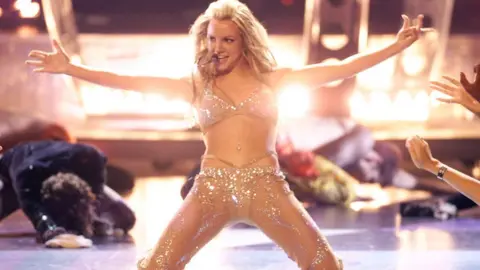 Getty Images
Getty Images"We can see Britney within a long line of women artists - from Marilyn Monroe to Whitney Houston and Amy Winehouse - who have been judged, not so much for the work that they produce but for the way in which they have been represented by the press," says Lucy Robinson, culture historian at the University of Sussex.
Nowhere was this clearer than during Britney's 2003 television interview with US journalist Diane Sawyer.
"She's like a laboratory experiment in the insulating power of relentless fame," the broadcaster told viewers. "Remember, no high school or college life to practise dating, no anonymity for trial and error and embarrassing choices."
Despite this apparent understanding, the tone of her questioning, which was persistent and accusatory in its focus on Britney's relationships and sex life, left the then 21-year-old in tears. At one point, Sawyer suggested the singer had "disappointed a lot of mothers in this country".
Double-standards?
The interview also pointed to another pressure - speculation over Britney's personal life.
As a clean-cut teen role model, she had sworn herself to chastity until marriage, but made headlines when she admitted to breaking this pledge with pop star boyfriend Justin Timberlake.
When the couple split, Timberlake sparked rumours of Britney's infidelity by including a cheating lookalike in his video for Cry Me a River.
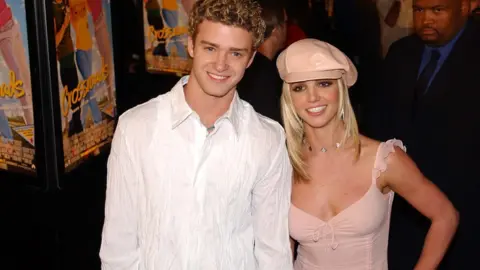 Getty Images
Getty ImagesSawyer pointedly questioned her morality on both counts in her interview, leading Britney to become emotional.
"The obsession with Britney's virginity absolutely highlights the sexual double standard between men and women, but more than that highlights how institutional the sexual exploitation and objectification of young girls is at the heart of the media and pop industry," says Robinson.
"There is no space in that context for younger women to own their own sexuality or explore it with agency. Instead they become responsible for adult men sexualising them, in the industry and in the audience."
Timberlake spoke freely about taking her virginity in radio interviews as he launched his solo career. After moving on from Britney, he famously appeared to grope Kylie Minogue's bottom on stage at the 2003 Brit Awards, earning him the nickname Justin Trousersnake, and was involved in Janet Jackson's infamous "wardrobe malfunction" at the 2004 Super Bowl.
'Lack of empathy'
Meanwhile, the intense speculation around Britney's private life continued as her marriage to dancer Kevin Federline - the father of her two children - collapsed.
The very public breakdown followed in 2007, with Britney shaving her head in full view of cameras, acting erratically and eventually being taken to hospital in an ambulance and sectioned after being deemed a danger to herself and others.
Her father Jamie Spears has been her conservator, or legal guardian, since 2008, due to concerns about her mental health.
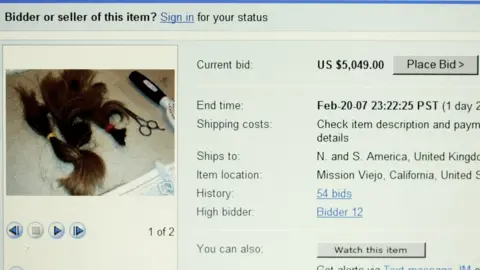 Getty Images
Getty ImagesThe intense media coverage of the breakdown underscored "the real lack of empathy that was shown towards Britney", says The Guardian's deputy TV editor Hannah Davies.
"A clear dehumanisation took place. A sense that Britney's actions were seen as existing in a parallel universe to all of the stresses and pressures of being in the spotlight.
"The judgement towards her was so socially acceptable too - think of all of the merch that mocked her breakdown, greetings cards and mugs about Britney surviving 2008. It feels so cheap to me, looking back."
Jen Offord, writer and co-presenter of the Standard Issue podcast, feels society has traditionally been "socialised not to believe women, or take their health problems seriously".
"I'm roughly the same age as Britney, so I don't think it occurred to me until around the time of the shaved head incident that the media was particularly tough on her," she says.
"It became painfully obvious to me how ill she was, and yet the public discourse around it was relentlessly unkind."
Part of the subsequent shift in mindset stems from an increased understanding around mental health and the media's role within in it - particularly following the death of Love Island presenter Caroline Flack last year.
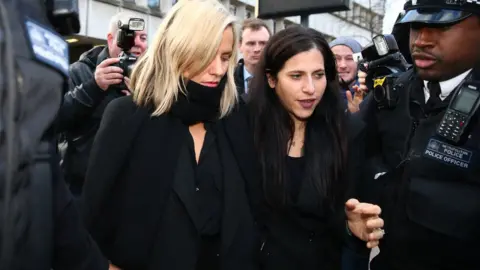 Getty Images
Getty Images"In the aftermath of her suicide, the public were suddenly extremely concerned about kindness in the media, but we as the public consume the very articles she was hounded over - they would not be written without our interest in the sometimes very obviously declining mental state of the central subjects.
"Kindness should not only be retrospective."
A new era?
So, does this mean the treatment of celebrities is softening?
Commentator Mic Wright says the positive response to Jesy Nelson's departure from girl group Little Mix last year, citing the need to protect her mental health, suggests the the media understands it can no longer be as "nakedly brutal".
"The tabloids know they need to pay lip service to mental health concerns and the right to a private life, but they still become obsessed with particular stars and put them under an enormous amount of pressure," he says.
But despite increased awareness, Hannah Davies isn't entirely sure the celebrity ecosystem is necessary kinder - but simply evolving into a "new industrial complex" between traditional and new media.
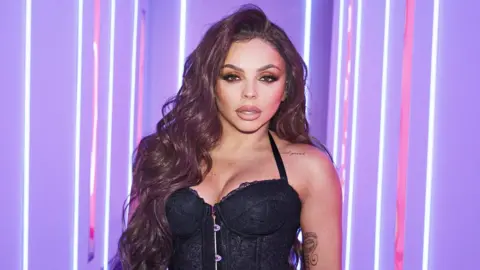
"I think we have a much better understanding of mental health now, but even so - watching Britney being harangued by paparazzi and seeing those headlines isn't something that's unique to the late 2000s.
"We're still seeing celebrities used and abused by the media, and the advent of reality TV and social has only made that surveillance more constant, and increased this conveyor belt of people whom the tabloids can support and then turn on.
"The BBC series Celebrity: A 21st Century Story showed how the relationship has grown and changed through social media, including Instagram and YouTube."
But while the power of these platforms can be destructive, as Nelson frequently discussed prior to her departure, they can also be empowering for celebrities.
'Take control'
Would it have helped Britney in the early 00s?
Indirectly, it already has. The legal battle around her conservatorship has been played out against the backdrop of the online #FreeBritney movement, led by fans who believe Spears is being controlled against her will.
"Social media has allowed celebrities to take control of their truth and rebut claims quickly," says The Independent's head of audience Beth Ashton. "When someone instantly challenges a claim and shares it with their millions of followers, it's impossible to ignore.
"The story changes and the headlines change too."
And, after the documentary came out, Britney, now 39, took to social media to say the public cannot know what life is like for "the actual person living behind the lens".
Allow X content?
"Would early noughties Twitter and Instagram be kinder to Britney than the media industry?" asks Ashton.
"I'm not sure, but at least, as her posts during her conservatorship battle and after the documentary have shown, it would have given her a voice."

Follow us on Facebook, or on Twitter @BBCNewsEnts. If you have a story suggestion email [email protected].
